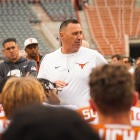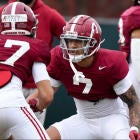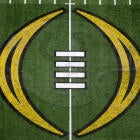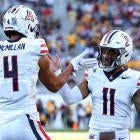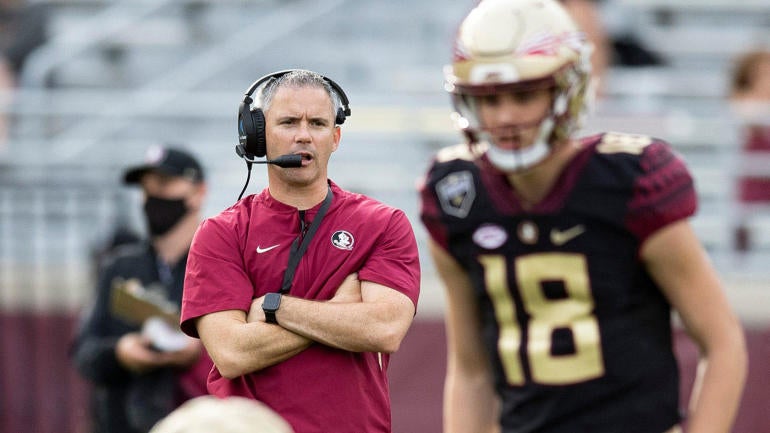
The second year of a head coaching stint in college football can be one of the most interesting points in a program's trajectory. Every offseason we take stock of coaches in this position because historically it has proven to be a pivot point. Some coaches, like Urban Meyer at Florida or Nick Saban at both LSU and Alabama, were in championship contention in Year Two.
Other coaches have struggled in ways that, depending on how things went in Year One, foreshadow a coaching change in the near future. Year Two got particularly interesting in 2019 when multiple Power Five coaches were fired after just their second season, including dismissals for Willie Taggart at Florida State and Chad Morris at Arkansas before the season had even concluded.
But while patience seems to be getting shorter than ever, the 2020 coaching class entering its second year bring an adjusted set of expectations due to the pandemic's impact on college football. Some coaches arrive to a program that is a rebuilding effort and we hear the phrase "Year Zero" as a signal to fans that it will take longer than usual to reach the expected levels of success. Well pretty much every coach hired in the 2019-20 cycle started at Year Zero with no (or limited) spring practice and strict protocols through the summer and fall that required much of the coaching to be done virtually.
Considering these obstacles it's hard to imagine putting any Year Two coach on the hot seat, but the success or lack thereof in 2021 will remain impactful in how these coaches are judged in the eyes of fans, and more importantly their bosses. The evaluation process was likely kinder at the end of 2020 but won't be in 2021, so considering what happened last year and the outlook for the fall we've broken down the profiles of eight coaches with the most on the line in Year Two during the 2021 season.
Dave Aranda, Baylor
2021 CBS Sports Coach Ranking: 62 (No change from 2020)
While Aranda rose through the ranks as a defensive coach, a primary focus for evaluating him as a head coach will be how his offense performs in 2021. Baylor went 2-7, only defeating Kansas and Kansas State at home, and was one of just two teams (the other being Kansas) in the Big 12 to average less than five yards per play. Aranda made a change at offensive coordinator, letting Larry Fedora go and bringing in Jeff Grimes from BYU. Grimes is notable for guiding top talent on the offensive line during his 28-year coaching career, including his part as OL coach in Auburn's 2010 national championship run with Cam Newton, but his success as a coordinator at BYU has given him the opportunity to be a difference-maker for Aranda's program. If the change works out there's a huge boost in confidence around a program that has proven it just needs a couple years to build up into a conference title contender.
The massive roster turnover kept expectations manageable for Aranda's first year and three of the seven losses were one-possession games, so things are on schedule in terms of expectations. But close losses, even good losses like the 38-31 defeat at Iowa State last season, need to be flipped into close wins in 2021.
Jimmy Lake, Washington
2021 CBS Sports Coach Ranking: No. 51 (+5)
It's really an issue of scarcity with Washington. Everything seems pivotal because we have so much less evidence to work with when comparing this very good program against other very good programs in preseason predictions and rankings. The Huskies only played four games, but won the Pac-12 North Division, then had to back out of the conference title game because of COVID-19 protocols. That put Oregon, a team that Washington didn't face, into the conference title game and the Ducks went on to hand USC its first and only loss of the season. So while we carry over some of the expectations that come with Lake's involvement with Washington football, it's still very early in the "Jimmy Lake era." Leading this team into The Big House for a date with Michigan in Week 2 will be about as revealing as anything we saw from the team on the field in 2020.
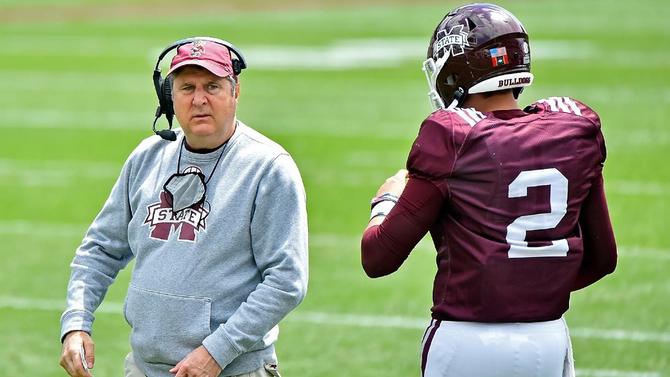
Mike Leach, Mississippi State
2021 CBS Sports Coach Ranking: No. 33 (-6)
It's worth revisiting the start to Mike Leach's time in the SEC. After torching LSU's defense in a record-setting way, Mississippi State failed to score more than 14 points in four straight games, and some of that was thanks to non-offensive touchdowns. Kylin Hill left the team and Will Rogers took over for K.J. Costello as the Bulldogs meandered their way through their SEC-only schedule and finished as one of the sub-.500 teams invited to a bowl due to teams opting out of the postseason. Of course they finished in dramatic fashion with a fight at the end of a win vs. Tulsa in the Armed Forces Bowl in horrendous weather, so I guess it was all worth it? Leach has a full offseason to work with Rogers and there's already evidence that he can be productive in the Air Raid system, so expectations should be a return to a bowl, this time with six or more wins.
Mike Norvell, Florida State
2021 CBS Sports Coach Ranking: No. 44 (-15)
I'm fascinated to see how things go next week at the ACC Media Days when Norvell has both McKenzie Milton and Jordan Travis with him to preview a 2021 season where the biggest storyline is who will win that quarterback battle. Milton does come with plenty of his own media intrigue as he makes his return from a catastrophic leg injury at the end of the 2018 season and the multiple surgeries that followed in its wake. Milton was prolific as UCF's starting quarterback in 2017 and 2018 but Travis, who was part of a revolving door of quarterbacks for Norvell in Year One, remains very much in the competition.
It's possible we could see Florida State use two quarterbacks in games and more likely that throughout the ups and downs of the year the Seminoles will need two capable quarterbacks, but how Norvell handles that battle will determine how the offense performs. Norvell's Memphis teams were scoring in the 40s and 50s with regularity but his first year with FSU saw a scoring average of 17.3 points per game across the team's six losses and 25.8 points per game on the season. It doesn't matter the quarterback, Norvell has to find ways to get Florida State more points in Year Two. The schedule is among the toughest in the country so the final record may not be reflective of the team, so it's important that the Seminoles give fans something to be excited about and fans love touchdowns.
Nick Rolovich, Washington State
2021 CBS Sports Coach Ranking: No. 58 (-8)
Like Apple Cup rival Washington, the Cougars only played four games in 2020 leaving us with very little to take away when judging Rolovich's first year. You look across the Pac-12 North Division and the conversation cuts two ways in terms of what we want to see from Washington State in 2021. There is an understanding, or at least an assumption, that Oregon and Washington are on a different tier, so no one's looking for Rolovich to have this group contending for titles in the fall. On the other hand, the Cougars are not definitively ahead of Stanford, Cal or even Oregon State. This is a big season for Rolovich because there are going to be three or four toss-up games that will determine whether the Cougars are in a bowl game or finish near the bottom of the conference standings.
Ryan Silverfield, Memphis
2021 CBS Sports Coach Ranking: No. 9 in AAC (+2)
The balance of power is shifting in the American Athletic Conference, and if Silverfield and the Tigers don't put together a strong season there are a handful of hopefuls looking to join the league's top tier. Three straight division titles and a conference championship in 2019 meant that 2020 felt like a step back even though the team went 8-4 and beat UCF with a roster that didn't include its two best skill position players due to opt-outs. Silverfield has to replace Brady White at quarterback and win those key games against the likes of UCF, Tulsa, Houston and SMU to return to their previously held position of competing for the conference championship every season. Silverfield gets a break here with Cincinnati not being on the schedule, while UCF and 2020 runner-up Tulsa both have to play the Bearcats in Nippert Stadium. That's a big advantage for Memphis in terms of making it to the conference title game, and it would provide a boost for Silverfield and the program if they can accomplish that feat.
Jeff Scott, South Florida
2021 CBS Sports Coach Ranking: No. 11 in AAC (-1)
While Chad Morris got his first head coaching job after having success as Clemson's offensive coordinator, his profile is defined more by his Texas high school football roots than his association with the Dabo Swinney coaching tree. Scott, a former Clemson wide receiver who moved from graduate assistant to full-time wide receivers coach when Swinney was promoted to head coach in 2008, has been challenged with taking those lessons from his time with the Tigers and applying them in a way that can make USF a contender in the AAC. Unfortunately the performance on the field in 2020 revealed a great distance between where the team is and conference championship contention.
USF won its first game of the year against The Citadel then lost eight straight to finish winless in AAC play. At times the 2020 season seemed like spring practice for this new coaching staff and a roster that's undergone plenty of turnover, with different personnel groupings (some of that injury and/or protocol related) and predictably inconsistent performances. But now that Scott has gotten a true spring and a full offseason, another year at the bottom of the conference is going to be a major disappointment. The Bulls need to find some wins against AAC foes to show proof of growth in this long-term plan to make USF a viable foe to Cincinnati and rival UCF.
Mel Tucker, Michigan State
2021 CBS Sports Coach Ranking: No. 57 (-2)
Hired in mid-February just weeks before the world came to a halt because of a global pandemic, Tucker, more than anyone on this list, enters his second season with expectations that treat 2020 like a true Year Zero. The program wasn't in terrible shape like other Year Zero situations, but the timing — not only losing spring practice and the summer but the cancellation and sudden restart for Big Ten football — left the Spartans way behind its peers in terms of building to a final product. Beating Michigan and handing Northwestern its only regular-season loss brought enough positivity to avoid any panic following Year One, as Tucker looks to take the next step and improve from a last-place finish in the division standings.
Oddsmakers say this isn't a bowl team with its 4.5 win total, but there are enough toss-ups on the schedule for the Spartans to reach 6-6. Exceeding those win total-based expectations would be a sign that Tucker has settled in and has Michigan State on a path back to where it wants to be near the top, not the bottom, of the Big Ten East.













